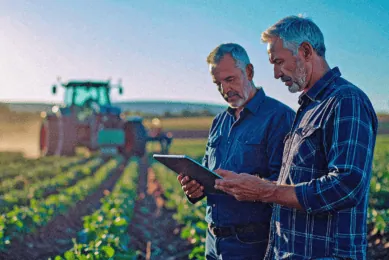Smart planter can deliver farmers a higher yield

Australian company Moisture Planting Technologies (MPT) has developed a tine based, tech-enabled broadacre planter that can monitor the conditions of the soil while planting.
It then can adjust itself to the optimal seeding depth. The planter uses a mixture of artificial intelligence and integrated sensors. The machine will be available for leasing and could deliver farmers up to 10% more yield.
CEO and founder David Finlay of MPT explains that there has been a big push towards bigger machines and an increase in horsepower in recent years. “We have seen several instances where there were breakages in machines. We then thought about solutions and started looking at ways to reduce the drag force in the air feeder. Ultimately the outcome was that we could monitor the soil condition as we were planting. This way the depth did not need to be deeper than was really needed.”
Text continues underneath image
Optimal seeding depth
In cooperation with a team of engineers David developed a planter, that can be used in ‘auto’ mode, where it can adjust itself to the optimal seeding depth. It can also be used in manual mode. Sensors are used to control seeding depth and to adjust the seeding rate, depending on the soil profile. “We monitor the soil conditions on properties such as moisture, biomass, temperature or soil ph”, David explains. “The properties depend on the soil type and other conditions.”
No internet connectivity required
The smart planter does not require internet connectivity. After planting data can be extracted, to overlay with other date, such as yield maps. It can also be used in conjunction with applications for spraying and fertilising. This gives farmers the full spectrum of crop data, from planting through to harvest.
David Finlay:
The difference is that our planter has a brain on it that can adjust itself, while collecting data
David says the machine won’t be much different from a traditional air feeder. “The difference is that our planter has a brain on it that can adjust itself, while collecting data.”
4 prototypes
So far MPT, that is based in Orange in the state New South Wales, has built 4 prototypes on a smaller scale. Currently the company is building a 12 meter air feeder to commence a number of trials. The planter can be attached to a tractor.
“For these trials we are looking at 2 or 3 different soil types and 3 different grain types,” David says. “From canola, which is quite a shallow crop, through to deep crop, such as chickpeas. We are now working on the details finalising the financing. Eventually there will be configurations available in 12, 18 and 24 meters.”
Text continues underneath video
David emphasises that MPT has spoken with a large number of farmers in different parts of Australia. “There is certainly a great deal of interest in what we are trying to achieve,” says David. “They want to use the technology in different ways, depending on their situation. In places like Victoria, where the rainfall is a bit more regular, for example, farmers wish to plant above the moisture profile as opposed to in it.”
Leasing
At the moment MPT is looking to lease the machines through a ‘by the hectare arrangement’ for farmers instead of offering a traditional purchase. “That allows farmers to pay for the use as opposed to pay for a piece of equipment that is not always used. We will provide it fully serviced. Farmers have the freedom to just use the technology as they need it without the burden of finance payments.”
Text continues underneath image
MPT believes there is a big international market for the new technology. “Certainly there is great potential in North America and Central Europe, where there are also drought issues,” says David. “The machine will be more beneficial in a low rainfall environment.”
Improving harvest by 8 to 10%
David says that MPT is now focusing on improving the harvest by 8 to 10%. “We probably don’t have the goals set this high for our initial trials. If we can get 5% in our trials, we will be happy. But our research indicates that we can achieve an improvement of up to 10%. And obviously we would be pretty ecstatic if we get that.”
Optimise fertiliser consumption
MPT has quite a few parties interested in the planter. “Bigger companies and research parties”, explains David. “CSIRO are looking at an early emergence of crops, which I think our machine can work well with. And some fertiliser companies expect that we can help them to optimise fertiliser consumption.”
The first commercial planters will be available for seeding around April next year, David expects. “We like to think that we can take commercial orders by September or October this year.”
Join 17,000+ subscribers
Subscribe to our newsletter to stay updated about all the need-to-know content in the agricultural sector, two times a week.



